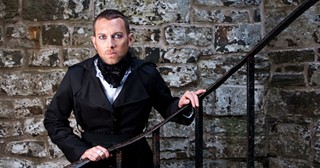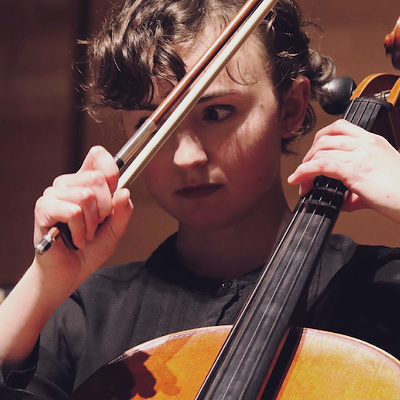Ryan MacGrath is sick. You can see it before you're even close enough to say hi, as he makes his way up the moderate incline of Blowers Street, offering a restrained wave. "My bones hurt," he says, with a hint of real worry in his voice---that voice---as he settles into a chair overlooking a Grafton parking lot baked to fuming in the July sun. A can of mineral water is all that fuels him.
But a bone-rattling illness is just a couch on the tracks in front of the Ryan MacGrath train---stop for a minute, shove it off, move on. He'll make up the time.
MacGrath is 31 and he's been making music as a singer-songwriter since he was 20, when he transferred from Acadia to NSCAD in 1998. "My first week in Halifax I bought a guitar, with my student loan. I thought I'd try writing things---even in high school, when I was younger, I was sort of envisioning myself playing and writing music. I could hear it in my head. My bus ride to school in the morning was an hour and a half, so I would come up with instrumental songs in my head. But I didn't know how to get it out."
He had the voice---a huge, silky, beautifully textured thing practically unimaginable in a town packed to the low ceilings with nasal frontmen---but he didn't know how to play. Well, "I knew G and C and A." He found his way, eventually, with help from a chord chart and copious Joni Mitchell listening. "The first songs were pretty wretched," he says. "My first song I ever wrote with guitar was called 'Bubble Gurgle Bubble.'"
The open mic circuit followed, including a hosting gig at former Barrington venue C'est Si Bon, then a band, thewoodenhouse. MacGrath was going for it now, this music thing, but it wasn't yet right. He's still friends with his former bandmates, but, "I was hearing my songs in a different way, a totally different arrangement, a different way of performing. I didn't want to have to scream all the time. I always felt like I was competing."
Ryan MacGrath grew up the fourth of five children, see-sawing between Guysborough County and Antigonish throughout his adolescence. "We were always looking at houses," he says, a good thing that has developed his current love of touring. "Moving and travelling is very natural to me. When we were kids, we'd get very excited if we were moving again because we got to set up our new house."
MacGrath started developing his voice as many singers do---in his living room, as a child. "We used to have one of those big-ass stereos from the '70s, you know, a piece of furniture with a record player, an 8-track player. I would entertain myself by putting on records and sitting with my ear right up against the stereo, on the speakers, and for hours just sing along and try to copy peoples' voices---Michael Jackson, Dolly Parton. And then I'd wear my sisters' prom dresses and dance around the living room."
In his teen years, parentally obligated to attend the United Church in Antigonish, MacGrath nabbed most of the lead roles in parish productions. "I was Snidely Whiplash in Dudley Do-Right, the evil villain. We did one called Percival the Performing Pig, and I was Percival---that was a musical. My mom made me this pink terrycloth costume, which she still has. I remember the rest of the cast was carrying me through the audience---the character had succeeded at something. My thirst for performance started there."
MacGrath's debut LP is called Cooper Hatch Paris, after the three people who lived in his old Dartmouth house before him, and it's a glorious, genre-stepping pop record that plants itself in the 1970s and time travels decades in either direction. He's backed up by Gypsophilia, with vocal contributions from Erin Costelo, Selah Koile, Katharine Langille and Chantal Kreviazuk.
Jason MacIsaac of The Heavy Blinkers, who has also helmed albums for Jenn Grant and Brent Randall, gets the official producing credit, but, "Ryan has a producer's mind, and sometimes my job was just to say 'I agree with you,' and sometimes my job was to stay out of the way and sometimes my job was to order pizza."
MacIsaac met MacGrath at Music Nova Scotia when MacIsaac was the membership coordinator. "A piece of me would die every time he didn't get funding. I stand by the decision-making," he says, "but I don't know, when I would see the things that were getting funded---it was so painfully obvious to me that Ryan was the next big thing."
Together they demoed between 25 and 40 songs, depending on who you ask. "Jason and I would go out for lunch and make lists of all the songs. I'd be like, 'OK: Write your top 10,'" says MacGrath. "And we'd look at each others' lists, and it just so happened that one day, they all matched up."
"The songs are of a quality that if we weren't trying to make a cohesive record, just a record of singles, there are as many good songs that were left on the cutting room floor," says MacIsaac. "Everybody goes through that weaning, but honestly we could've picked another 12 songs and I would've been happy. His writing is so extremely good."
Gypsophila recorded the music in two days, live off the floor at Codapop Studios on Quinpool Road, with an intensive two-month rehearsal period preceding. "Kind of in the Motown or Phil Spector mindset, we wanted people who played together all the time and had an unspoken rapport and language," says MacIsaac. "There's nothing about it initially that's demonstrative of Gypsophilia's music, however when you just listen to the tracks, there's so many things they're doing, so nuanced they're almost undetectable, but the record would be so different if we'd hired quote-unquote studio cats, or indie kids. ... But we didn't hire them to be Gypsophilia, we hired the members of Gypsophilia to play together on a pop record."
"They all read music and I don't, and I'd be like 'Sageev [Oore], can you give me this piano line?'" says MacGrath, "and I'd be humming it out and he'd have to interpret what I was trying to tell him, which made me embarrassed sometimes."
The rehearsing paid off---the band nailed each song in a couple of takes each. Mike Belyea of Snailhouse came in later to dub drums, which, as the spine of the music, are usually recorded first. "There was always going to de drums, but it wasn't until we laid down the drums that things started sounding like Bowie and Blondie," says MacIsaac. "Up to that point, it sounded like a singer-songwriter record."
Which makes sense, considering that's what MacGrath has always been drawn to. Cooper Hatch Paris has an analog feeling, languid and fluid, which wasn't a stated goal, but "when it started happening and I started recognizing it, I got pretty excited because I find it's crossing this border of not being really recognizable but at the same time being in the '70s," he says. "I like that. The instrumentation isn't '70s at all. A lot of the beats are actually drawn from hip-hop beats."
MacIsaac, who credits Codapop engineer Eric Leclerc with the warm sound of the album, reveals a production secret: "Ryan wanted the record to sound like he was canoeing at night, in a beautiful calm lake, but there were all sorts of scary monsters under the water that may or may not rip him to shreds," he says. "That was one of the things I used...he wants everything to sound floral, very pretty and austere sometimes, but there are some things in the extreme background very low in the mix that we did that are horrible. They're hideous, terrible, scary, scary noises. You don't consciously hear them, and maybe to some degree that make you feel a little unsettled."
Lyrical content varies. "Most of my songs are about being pathetic and lonely," says MacGrath, laughing through the pain. The opener "Gifthorse" worries about opportunities past and squandered, the powerful refrain "We shall inherit what went wrong" pulling the song into anthem. "God Forbid," with response vocals from Erin Costelo, finds MacGrath in the wake of his uncle's death, worrying that suicide is inherited. "State of the Art" is a disco-infused crush song that finds beauty in the mothball-scented air of Value Village. "My Boyfriend" is the centre torch song in a lost gay musical from the '50s, while "Sullivan's Pond" is the climax to one about Dartmouth.
Through the entire record, MacGrath reigns his instrument in, preferring to unleash it at carefully chosen high points. "I was surprised at how much he was undersinging, because it just seemed counter-intuitive," says MacIsaac. "But if he started at 10 and went from there, it would be so over the top. I said this during the recording process: He is 95 pounds, and 85 pounds are octaves."
Now that the record is recorded, pressed and about to be released---in stores July 31, with a release party at The Carleton in September, during the Atlantic Film Festival---MacGrath is trying to navigate his way through the music industry. The local scene is known for embracing new arrivals, but he says he didn't feel that. "There was always a few pockets of people who were interested and pushed me on, but as far as the inner workings of the Halifax music industry---it took a long time."
"I really feel in this city that until recently he's been an underdog," says MacIsaac.
MacGrath has been playing a steady stream for months, all over Nova Scotia and up to Central Canada and back---in the week after we meet he's got four shows, including a Bowie tribute---and feels like he knows what's up in Halifax and Toronto, but now the struggle becomes a global one.
"I often ask people for advice who I think would have it, or should have it. And no one seems to have any answers," he says. "Everyone says, 'This person's doing that, it seems to be working.' Well, I'm not that person. If you ask about marketing or distribution, it's like 'This company does that, these people do that,' but there's no specific formula, there's no book you can read.
"I slowly set this up, trying to figure out where it should go. Especially with this album because it is such an investment, not only on my part but on the part of everyone involved. I really want to make sure it does something. This isn't a hobby anymore, it's a serious product that we've created."
"I don't know what it would take for him to not become a huge star. It is inevitable, if there's any justice in the world," says MacIsaac. "It's such a fully realized record for a debut record."
"You could write one song in your entire life," says MacGrath. "And maybe it connects with everyone. And I'm really interested in that, whatever that is, that makes it work."















